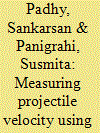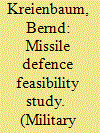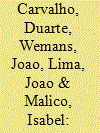|
|
|
Sort Order |
|
|
|
Items / Page
|
|
|
|
|
|
|
| Srl | Item |
| 1 |
ID:
177306


|
|
|
|
|
| Summary/Abstract |
The main objective of this study is to provide a systematic decision support framework based on a holistic simulation approach that allows systematically the technical and economic analysis of a wind power plant (WPP). This model-based spread-sheet consists of various economic and technical indicators, including from the Weibull parameters to the cost of electricity generation. Various scenario-based analyses, namely WPP-1, WPP-2, and WPP-3, with wind turbines with different rated power are conducted for the proposed WPP. In this study, the capacity factor fluctuates from 25.62% to 30.03% while the annual electricity generation is in the range from a minimum of 22.449 MW and a maximum of 26.837 MW. Regarding economic indicators, the Internal Rate of Return (IRR) and the Levelized Cost of Electricity (LCOE) range from 11.7% to 17.38% and from 0.0665 €/kWh to 0.0771 €/kWh, respectively. By discussed and compared both economic and technical indicators, the most feasible scenario selection phase, which is the focal point of the study, is realized to construct and operate the proposed WPP. The developed simulation may be applied to other countries as well and in this way, it helps to be shaped strategic energy policies related to wind energy.
|
|
|
|
|
|
|
|
|
|
|
|
|
|
|
|
| 2 |
ID:
177380


|
|
|
|
|
| Summary/Abstract |
The adoption of solar photovoltaic and electrical energy storage by end users depends on their economic attractiveness, which is typically assessed with metrics of future cash flow such as Net Present Value (NPV). Yet analyses using NPV typically do not account for the evolution towards low-carbon electricity systems in the short and long term. We show this to be of critical importance for accurately calculating the profitability of these technologies.
|
|
|
|
|
|
|
|
|
|
|
|
|
|
|
|
| 3 |
ID:
105800


|
|
|
|
|
| Publication |
2011.
|
| Summary/Abstract |
Nowadays all countries are developing their own policies to promote cogeneration in the small-scale residential sector. In this paper the feasibility of small-scale gas engine-based residential cogeneration plants under the current Spanish regulation is studied. A unitary thermal load profile is obtained to characterised the thermal demand of residential applications in Spain. This unitary profile is used to analyse the potential of cogeneration in the small-scale range of powers (100-1000 kW). A complete characterisation of the gas fuelled engines in the market is performed and subsequently used to evaluate the economic feasibility within the selected range by means of a self-tailored simulation model. It is underlined how the thermal storage is a crucial element that should be suitably included in a residential cogeneration plant and the distortions that the actual pricing system adds to the profitability of residential plants of different sizes. Finally a sensibility study is carried out in order to evaluate how the Spanish regulation is able to deal with future variations in the energy prices. It is shown that a rise in the price of the natural gas increases the current feasibility of a plant while a decrease descends the profitability.
|
|
|
|
|
|
|
|
|
|
|
|
|
|
|
|
| 4 |
ID:
136037


|
|
|
|
|
| Summary/Abstract |
This paper deals with development of velocity measurement methodology based on projectile shock wave pressure measurements. The measurement principle is based on the fact that, whenever a projectile moves with supersonic velocity, shock wave fronts are produced along the trajectory of the projectile. Measurement configuration has been developed for measuring the shock wave pressure associated with projectile in flight, and hence, projectile velocity has been calculated. This paper covers various aspects of shock waves, generation of N Waves, feasibility study for capturing shock wave using dynamic microphone. Finally, suitable piezo-electric sensor has been selected and deployed in the trials and shock wave signature has been captured. From shock wave pressure, the projectile velocity has been computed.
|
|
|
|
|
|
|
|
|
|
|
|
|
|
|
|
| 5 |
ID:
073818


|
|
|
| 6 |
ID:
109428


|
|
|
|
|
| Publication |
2011.
|
| Summary/Abstract |
This paper evaluates the benefits of developing the mini-generation PV market in Portugal. It presents the legal framework and current status of the Portuguese PV electricity sector, and compares the country to other European nations: France, Germany, Greece, Italy, Spain and the United Kingdom. A model that combines PVGIS with a self-developed financial tool is used to assess the feasibility of a 150 kW mini-generation system using five different technologies: fixed mount, single-axis tracking, double-axis tracking, low concentration and medium concentration (MCPV). The profitability of the mini-generation systems in the seven countries studied is calculated and compared. According to this analysis, MCPV and, of the conventional technologies, the single-axis tracking systems are the most profitable technologies. Despite the attractiveness of the current Portuguese feed-in tariffs and of the abundant solar resource, investors are discouraged and the country's PV market is far from mature. Specific mini-generation regulations should focus on a fast and transparent licensing procedure and should promote the access to financing. This would attract new investments, which would result in the growth of the PV electricity produced, and would help Portugal to meet its European Union Renewable Energy targets.
|
|
|
|
|
|
|
|
|
|
|
|
|
|
|
|
|
|
|
|
|